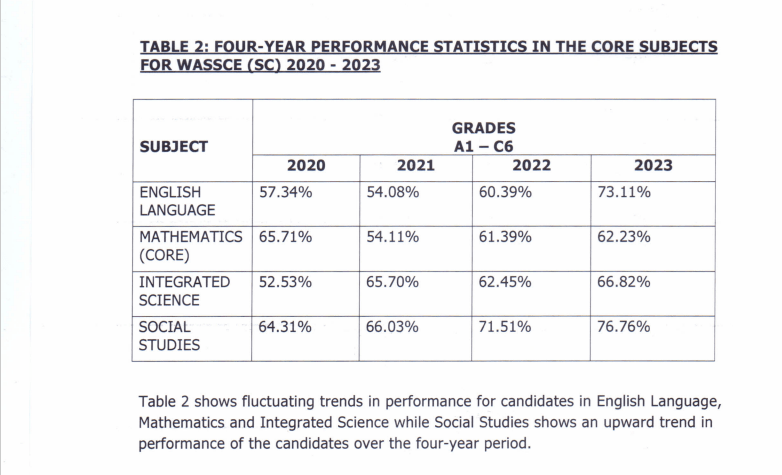The release of the provisional results for the 2023 West African Senior School Certificate Examinations (WASSCE) by the West African Examinations Council (WAEC) sheds light on the challenges and issues plaguing secondary education in Ghana.
With 448,674 candidates participating, the 2023 WASSCE witnessed an increase of 5.8% in entry figures compared to the previous year.
A total number was made up of 212,453 males and 236,221 females from 975 schools entered for the examination.
“The West African Examinations Council wishes to inform its numerous stakeholders that it has released provisional results of candidates who sat for the WASSCE for School Candidates, 2023 (Ghana Only Version). The Council will make available login details to heads of school to enable them to access the results of their candidates.”
WAEC
Data from WAEC shows that students performed better in all core subjects in a year-on-year analysis.

This particular indicator has been a trump card of the Ministry of Education in its defense of the quality of education at the secondary level and the Free SHS policy. Many have argued that that is a limited perspective given the broad daylight challenges facing secondary education in Ghana.
Assessing The Quality Of Ghana’s Secondary Examination
A concerning aspect has also emerged as the results of 4,878 candidates have been blocked.
“The results of 4,878 candidates have been blocked for failing to return learning support materials supplied to them by their schools. Such candidates are to contact their schools.”
WAEC
This highlights a systemic problem in the administration and accountability of educational resources. The call for these affected candidates to contact their schools raises questions about the effectiveness of resource management within educational institutions.
Another alarming revelation is the cancellation of subject results for 3,647 candidates caught with foreign materials in the examination halls and the cancellation of entire results for 839 candidates found in possession of mobile phones during the exams. These incidents point to a lack of stringent examination security measures and raise concerns about the integrity of the examination process.

Furthermore, the withholding of subject results for 4,280 candidates and the entire results of 1,005 for various suspected offenses, including collusion and the use of artificial intelligence-generated answers, indicates the need for a thorough investigation into malpractices. This calls into question the measures in place to prevent cheating and maintain the integrity of the examination system.
The decision to cancel and withhold results reflects the broader issue of maintaining discipline and upholding ethical standards in the education system. The credibility of the examination process is crucial for the future of students and the reputation of Ghana’s education system.
Additionally, the communication from WAEC emphasizes cautioning candidates against fraudulent schemes promising result upgrades for a fee. This warning hints at a prevailing issue of dishonest practices in the education sector, creating a need for increased vigilance and security measures to safeguard the integrity of examination results.
In addressing these challenges, educational authorities need to conduct a comprehensive review of examination procedures, resource management, and security protocols. Stricter measures and effective enforcement mechanisms should be implemented to deter malpractices and ensure the credibility of examination results.
Ghana’s aspiration to enhance the quality of its education system demands a critical evaluation of the issues revealed by the 2023 WASSCE results is imperative.
The commitment to providing quality education must be reflected not only in policies but also in the effective implementation of measures that foster a conducive learning environment, maintain examination integrity, and ensure accountability at all levels of the education system.
READ ALSO: NDC-NPP “X-Contest” Over Deteriorated Cocoa Roads




















